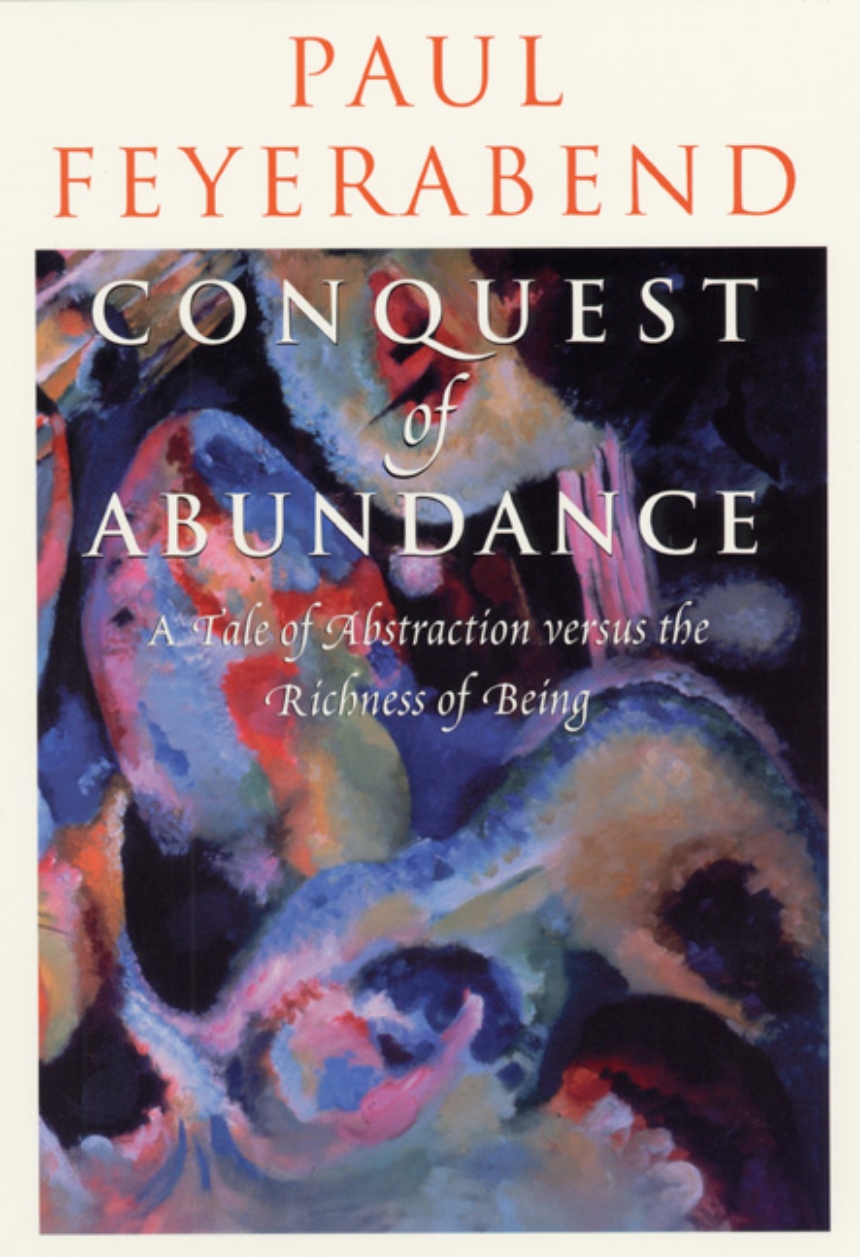Conquest of Abundance
A Tale of Abstraction versus the Richness of Being
From flea bites to galaxies, from love affairs to shadows, Paul Feyerabend reveled in the sensory and intellectual abundance that surrounds us. He found it equally striking that human senses and human intelligence are able to take in only a fraction of these riches. "This a blessing, not a drawback," he writes. "A superconscious organism would not be superwise, it would be paralyzed." This human reduction of experience to a manageable level is the heart of Conquest of Abundance, the book on which Feyerabend was at work when he died in 1994.
Prepared from drafts of the manuscript left at his death, working notes, and lectures and articles Feyerabend wrote while the larger work was in progress, Conquest of Abundance offers up rich exploration and startling insights with the charm, lucidity, and sense of mischief that are his hallmarks. Feyerabend is fascinated by how we attempt to explain and predict the mysteries of the natural world, and he looks at the ways in which we abstract experience, explain anomalies, and reduce wonder to formulas and equations. Through his exploration of the positive and negative consequences of these efforts, Feyerabend reveals the "conquest of abundance" as an integral part of the history and character of Western civilization.
"Paul Feyerabend . . . was the Norman Mailer of philosophy. . . . brilliant, brave, adventurous, original and quirky."—Richard Rorty, New Republic
"As much a smudged icon as a philosophical position holder, [Feyerabend] was alluring and erotic, a torch singer for philosophical anarchy."—Nancy Maull, New York Times Book Review
"[A] kind of final testament of Feyerabend’s thought . . . Conquest of Abundance is as much the product of a brilliant, scintillating style as of an immense erudition and culture. . . . This book is as abundant and rich as the world it envisions."—Arkady Plotnitsky, Chicago Tribune
Prepared from drafts of the manuscript left at his death, working notes, and lectures and articles Feyerabend wrote while the larger work was in progress, Conquest of Abundance offers up rich exploration and startling insights with the charm, lucidity, and sense of mischief that are his hallmarks. Feyerabend is fascinated by how we attempt to explain and predict the mysteries of the natural world, and he looks at the ways in which we abstract experience, explain anomalies, and reduce wonder to formulas and equations. Through his exploration of the positive and negative consequences of these efforts, Feyerabend reveals the "conquest of abundance" as an integral part of the history and character of Western civilization.
"Paul Feyerabend . . . was the Norman Mailer of philosophy. . . . brilliant, brave, adventurous, original and quirky."—Richard Rorty, New Republic
"As much a smudged icon as a philosophical position holder, [Feyerabend] was alluring and erotic, a torch singer for philosophical anarchy."—Nancy Maull, New York Times Book Review
"[A] kind of final testament of Feyerabend’s thought . . . Conquest of Abundance is as much the product of a brilliant, scintillating style as of an immense erudition and culture. . . . This book is as abundant and rich as the world it envisions."—Arkady Plotnitsky, Chicago Tribune
Table of Contents
Acknowledgments
Preface
A Note on the Editing
Part One: The Unfinished Manuscript
Introduction
1. Achilles’ Conjecture
2. Xenophanes
3. Parmenides and the Logic of Being
Interlude: On the Ambiguity of Interpretations
4. Brunelleschi and the Invention of Perspective
Part Two: Essays on the Manuscript’s Themes
1. Realism and the Historicity of Knowledge
2. Has the Scientific View of the World a Special Status Compared with Other Views?
3. Quantum Theory and Our View of the World
4. Realism
5. Historical Comments on Realism
6. What Reality?
7. Aristotle
8. Art as a Product of Nature as a Work of Art
9. Ethics as a Measure of Scientific Truth
10. Universals as Tyrants and as Mediators
11. Intellectuals and the Facts of Life
12. Concerning an Appeal for Philosophy
Preface
A Note on the Editing
Part One: The Unfinished Manuscript
Introduction
1. Achilles’ Conjecture
2. Xenophanes
3. Parmenides and the Logic of Being
Interlude: On the Ambiguity of Interpretations
4. Brunelleschi and the Invention of Perspective
Part Two: Essays on the Manuscript’s Themes
1. Realism and the Historicity of Knowledge
2. Has the Scientific View of the World a Special Status Compared with Other Views?
3. Quantum Theory and Our View of the World
4. Realism
5. Historical Comments on Realism
6. What Reality?
7. Aristotle
8. Art as a Product of Nature as a Work of Art
9. Ethics as a Measure of Scientific Truth
10. Universals as Tyrants and as Mediators
11. Intellectuals and the Facts of Life
12. Concerning an Appeal for Philosophy
